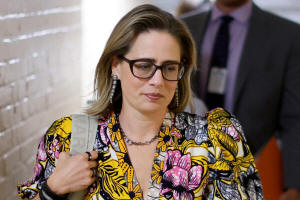|
"Like a lot of Arizonans, I have never fit perfectly in either
national party," Sinema said in an article for the Arizona
Republic newspaper.
Sinema intends to maintain her committee assignments from the
Democrats, an aide told Reuters on condition of anonymity. The
aide would not say whether or not Sinema would continue to
caucus with Democrats.
Sinema herself, however, said she would not caucus with the
Republican Party, according to an interview published by
Politico on Friday. If that holds, Democrats could still
maintain greater governing control in the closely divided
chamber.
Sinema and Democratic Senator Joe Manchin have kept Washington
in suspense over the last two years as they repeatedly have
withheld their needed votes for legislative initiatives sought
by President Joe Biden.
At the same time, they have worked in a bipartisan way on
high-profile bills that have become law. Just this week, Sinema
and Republican Senator Thom Tillis unveiled an immigration
reform plan that is getting attention in the Senate.
In the Arizona Republic article, Sinema described her
disillusionment with what she described as a rigid two-party
system that encourages partisanship over independence.
"I have joined the growing numbers of Arizonans who reject party
politics by declaring my independence from the broken partisan
system in Washington. I registered as an Arizona independent,"
Sinema wrote.
Democrats had held the Senate 50-50 with Vice President Kamala
Harris holding a tie-breaking vote. U.S. Senator Raphael
Warnock's victory in Tuesday's run-off election in Georgia had
handed them their 51st seat.
Two other current senators - Bernie Sanders of Vermont and Angus
King of Maine - are registered independents but caucus with
Democrats.
Sinema on Friday said her shift came as a growing number of
people in her Western U.S. state were also declaring themselves
politically independent, rejecting both the Republican and
Democratic political labels.
"We don’t line up to do what we’re told, automatically subscribe
to whatever positions the national political parties dictate or
view every issue through labels that divide us," she wrote.
(Reporting by Richard Cowan, Susan Heavey and Doina Chiacu;
Editing by Alison Williams and Chizu Nomiyama)
[© 2022 Thomson Reuters. All rights
reserved.] Copyright 2022 Reuters. All rights reserved. This material may not be published,
broadcast, rewritten or redistributed.
Thompson Reuters is solely responsible for this content.

|
|




